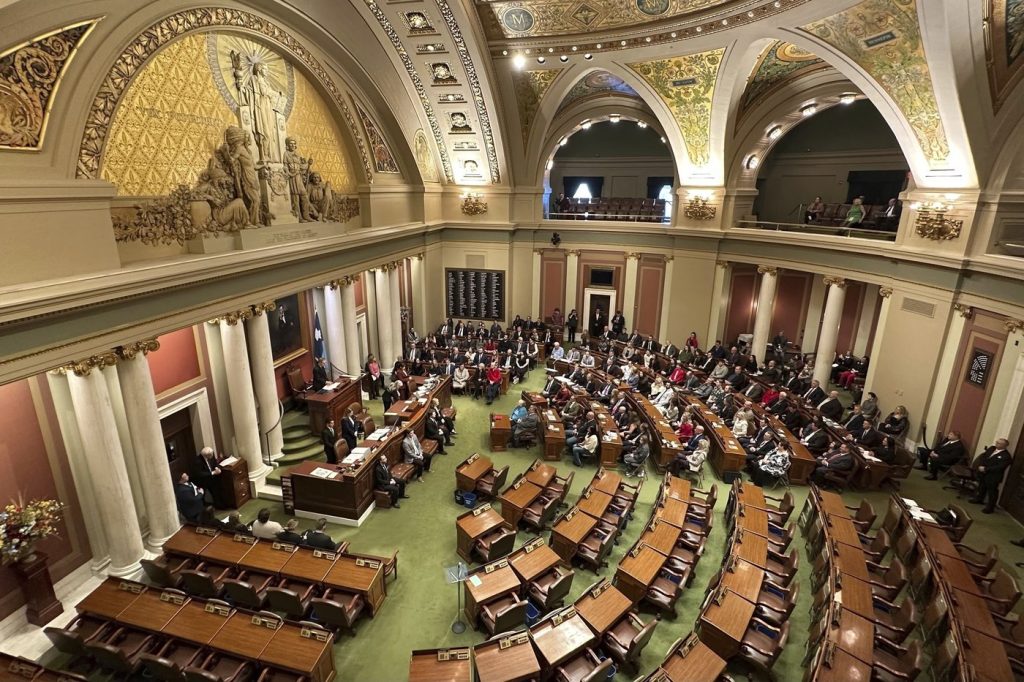Democrats boycott first day of Minnesota House session but GOP votes to appoint speaker anyway

Posted Jan 14, 2025 12:47:19 PM.
Last Updated Jan 14, 2025 10:45:20 PM.
ST. PAUL, Minn. (AP) — House Democrats boycotted the opening day of Minnesota’s 2025 legislative session Tuesday in an effort to stop Republicans from exploiting a temporary one-seat majority to remove one of their members. But GOP representatives forged ahead anyway and named their leader as speaker in a move that Democrats vowed to challenge in court.
There was applause as Democratic Secretary of State Steve Simon entered the chamber to convene the proceedings in accordance with state law. But the Democratic side of the House chamber was empty and only Republicans replied “present” as a clerk took the roll.
Simon announced they had not reached the 68 members needed for a quorum, declared the chamber adjourned and left.
But Republicans stayed in their seats, saying that with 67 members present they had a quorum. They then voted to elect their top member, former Minority Leader Lisa Demuth, of Cold Spring, as speaker, a move that Democrats immediately denounced as an “unlawful sham with no legal authority.”
The key sticking point is whether Republicans will make good on a threat to refuse to seat incumbent Democratic Rep. Brad Tabke, of Shakopee, who won reelection by 14 votes even after local elections officials said 20 ballots were accidentally destroyed without being counted. A judge earlier Tuesday declared that Tabke was the legal winner and rejected a GOP effort to force a special election in the swing district that they potentially could have won.
The House came out of the November election tied 67-67, and top leaders from both parties started to work out a power-sharing agreement that presumed a tie. But a different judge late last month declared that a newly elected Democrat in another, heavily Democratic district, didn’t really live there.
That gave the GOP a 67-66 majority until a special election can take place there in two weeks. Republicans then declared their intent to take full advantage until the tie is restored and threatened to refuse to seat Tabke even if they lost the court case.
The top House Democrat, former Speaker Melissa Hortman, of Brooklyn Park, said at a news conference in Tabke’s district in Shakopee that Republicans would not commit in final negotiations to letting Tabke keep his seat.
Hortman said she had proposed letting Demuth become speaker for the full session but otherwise revert to an earlier power-sharing agreement, assuming that the special election restores the tie. But she said Demuth would not rule out taking action to move against Tabke at some point.
Demuth vowed in an acceptance speech to “work tirelessly” to foster a “culture of respect and civility” in the House, but she didn’t directly mention the boycott.
“We owe it to the people that we represent to debate passionately, but we also owe them the respect of agreeing that sometimes we do disagree,” she said. “So let’s focus on what unites us.”
Republicans then adjourned until Wednesday. The No. 2 Republican leader, Rep. Harry Niska, of Ramsey, told reporters afterward that Simon, as a member of the executive branch, is barred by the constitutional separation of powers from controlling the work of the House.
But House Democrats said the GOP actions were illegal and that Demuth is not speaker. Simon said in a statement that he intends to ask the Minnesota Supreme Court to rule that the GOP moves were not legitimate.
“I anticipate that the courts will provide clarity, both on that issue and on the understanding that the person who holds the Secretary of State’s office is the presiding officer until a Speaker is legally elected — an event which has not yet occurred,” Simon said.
It’s unclear how long the courts might take to resolve the dispute.
This is the first time the Minnesota Legislature has faced such a boycott, but similar stalling tactics have been used elsewhere.
Democrats in neighboring Wisconsin went into hiding in 2011 in a standoff with majority Republicans over union rights for public employees. Oregon Republicans staged multiple walkouts in recent years, including a record six-week walkout in 2023 over bills on abortion, gender-affirming care and gun rights. The top Democrat in the Michigan House last month ordered absent members back and barred the doors after a Democrat joined Republicans in skipping out.
The high-stakes poker in the Minnesota House contrasts with the calm that prevailed Tuesday in the state Senate, which is tied 33-33 pending a Jan. 28 special election to fill the seat of a deceased senator. That’s expected to restore the Democrats’ 34-33 majority. Senate leaders quietly reached a power-sharing deal that includes co-presiding officers from both parties.
The polarization in the House raises interesting and unresolved legal questions, said David Schultz, professor of political science at Hamline University in St. Paul, Minnesota.
“We are in uncharted legal territory,” Schultz said, because language in the state’s constitution and laws is ambiguous and there aren’t any definitive answers.
It’s also not clear whether the state’s courts can intervene to resolve the infighting of the legislative branch of government, Schultz said, or whether Republicans would have to abide by a judicial opinion if they did so.
“It’s starting off intensely ugly,” Schultz said, “and it’s not going to bode well for the rest of the session.”
___
Associated Press reporter Hannah Fingerhut contributed to this story from Des Moines, Iowa.
Steve Karnowski, The Associated Press








